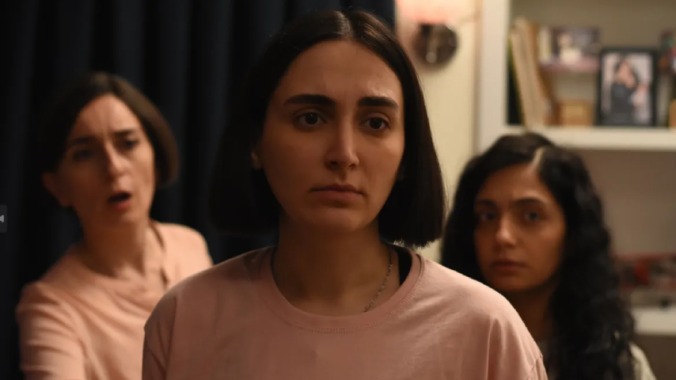From The Seed of the Sacred Fig Grows a Disappointingly Obvious Metaphor

It’s not every day you get to see a film made by an exiled filmmaker as he tours the world stage, recounting his struggle against violent government censorship. In a tangible sense, Mohammad Rasoulof is one of the bravest filmmakers working today. He first experienced wrongful imprisonment in 2010, when he was arrested and sentenced to a year in prison for filming without a permit. The pressure to buckle under the immense weight of government censorship has only heightened in the subsequent years; since then, Rasoulof has served time on different occasions, for a variety of ridiculous reasons, ranging from “creating propaganda” to criticizing the Iranian government. Rasoulof was serving time in 2022 for criticizing the Iranian government’s crackdown on protests when he originally conceived of The Seed of the Sacred Fig, as protests broke out in the streets over womens’ rights issues. Mahsa Amini was arrested for “wearing her hijab wrong” and was murdered by police, sparking one of the largest womens’ movements in Iran in recent memory. According to the Iran Human Rights organization, at least 551 people were killed by police during the civil unrest, 68 of them minors.
Combined with the protests outside the prison walls, Rasoulof was inspired by a prison guard he met while inside. Hesitant to trust the government official at first, Rasoulof saw the man in a new light when the guard confessed that he spent his days “staring at doors and fixtures, wondering which one he would hang himself from,” as Rasoulof recounted at the Locarno press conference.
This man inspired The Seed of the Sacred Fig’s patriarch Iman (Missagh Zare), whose promotion to investigating judge on Tehran’s Revolutionary Court creates tensions both within his view of himself and within his family dynamic. On his first day of the job, Iman is asked to approve without question a death warrant for a case he has not read, with the implication that his refusal would mean termination—possibly worse. His wife Najmeh (Soheila Golestani) is thrilled about her husband’s promotion because she wants a nicer apartment with better laundry facilities. Fair enough, but at what cost to her husband’s sanity, her daughters’ safety and human life at large?
The moral question of blindly following orders for the sake of survival in a volatile state is an engaging one—and one that Rasoulof drops almost immediately in a film with a nearly three-hour runtime. The narrative shifts to Iman and Najmeh’s two adult daughters, Rezvan (Mahsa Rostami) and Sana (Setareh Maleki), who are treated like adolescents as their parents’ stringent rules tighten up even further with Iman’s new job putting the whole family under the microscope of the state. The girls aren’t directly involved in the women’s revolt that breaks out—their mother’s sharp gaze would never allow it—but they are glued to the videos of hideous violence on their smartphones in secret. When Rezvan’s best friend Sadaf (Niousha Akhshi) is brutally maimed in a protest, and eventually goes missing, Rezvan is further radicalized against the system her father dutifully serves.
-

-

-

-

-

-

-

-

-

-

-

-

-

-

-

-

-

-

-

-

-

-

-

-

-

-

-

-

-

-

-

-

-

-

-

-

-

-

-

-








































